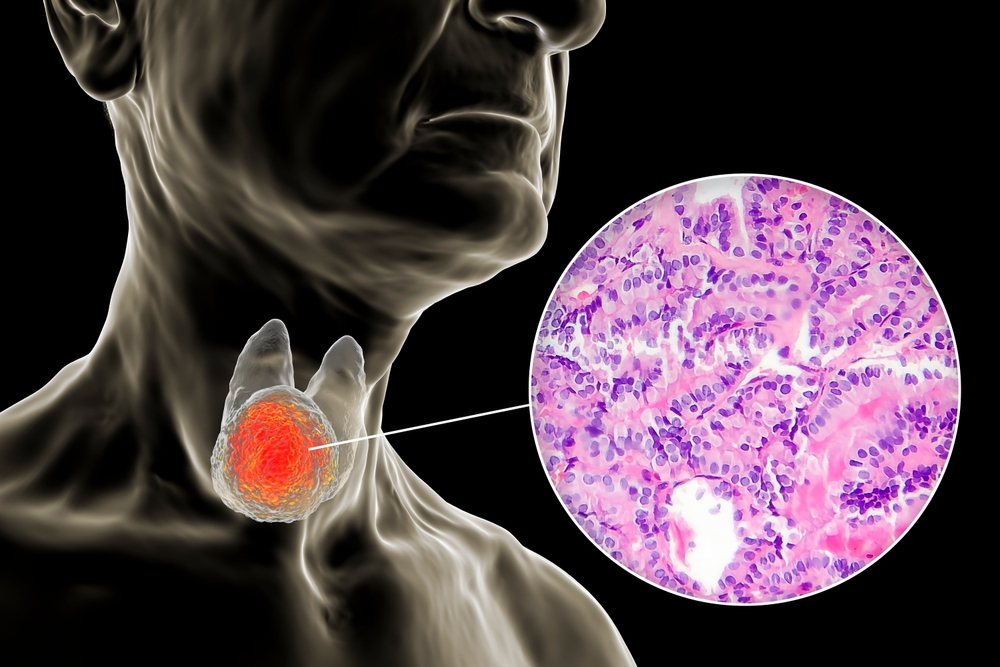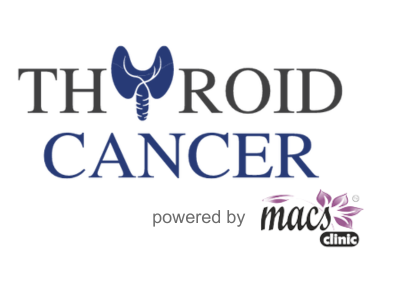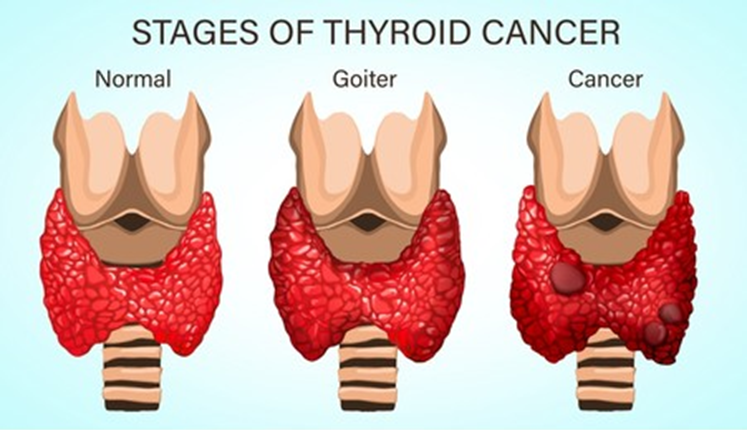Staging of Thyroid Cancer
This page provides information on Thyroid Cancer Staging. Understanding the staging process is crucial for patients diagnosed with thyroid cancer. It provides essential insights into the extent of the disease and helps guide treatment decisions. The information on this site has been curated by Dr. Sandeep Nayak from MACS Clinic, Bangalore. He is a highly regarded surgical oncologist in India, renowned for his expertise in thyroid cancer surgery. Dr. Sandeep Nayak has developed the minimally invasive RABIT technique for thyroidectomy.
Understanding Differentiated Thyroid Cancer (DTC) Staging
What is Differentiated Thyroid Cancer (DTC)?
DTC is the term used to describe the most common types of thyroid cancer. These types of cancer are known for their ability to produce thyroid hormones and favourable prognosis. There are two main types of DTC:

Papillary thyroid cancer:
This is the most common and slow-growing type of thyroid cancer. Papillary thyroid cancer accounts for around 80% of all cases. It usually affects only one lobe of the thyroid gland.

Follicular thyroid cancer:
Follicular cancer accounts for 10-15% of thyroid cancers. It is more common in older adults. Follicular thyroid cancer can metastasize to the lungs and bones.
Have a Question?
Now, let’s uncover the process behind staging DTC and why it matters. Stay informed for better decisions.
How is DTC Staged?
Staging is the process of determining cancer’s location, spread, and impact on other organs. DTC staging involves a combination of the following:
Physical examinations
Imaging tests
The staging system for DTC is TNM, an acronym for Tumor, Node, Metastasis:
Tumor (T): Refers to the size of the original tumor and its proximity to nearby areas.
Node (N): Denotes whether cancer has spread to nearby lymph nodes. These are tiny structures that help the body fight infection.
Metastasis (M): Refers to the spread of cancer cells from the original tumor to other body parts. It is a crucial factor in determining the stage and severity of cancer.
Stages of DTC for Patients Under 55 Years of Age:
For patients under 55 years of age, there are two stages of DTC:
Stage I :
Cancer is limited to the thyroid and may have spread to nearby lymph nodes. But it has not spread to distant parts of the body.
Stage II :
Cancer has spread to distant body parts, such as the lungs or bones.
This indicates that younger age has better outcomes.
Stages of DTC for Patients 55 Years and Older:
For patients aged 55 and above, the staging process includes:
Stage I :
The thyroid tumor is small. It has not grown outside of the thyroid. It has not spread to distant parts of the body.
Stage II :
The tumor is larger than in stage I, or it has slightly grown outside of the thyroid gland. However, it has not spread to other parts of the body.
Stage III :
The tumor may be any size. It may have reached the nearby lymph nodes. However, it has not spread to other parts of the body.
Stage IVA :
The tumor has grown extensively beyond the thyroid gland and has spread to nearby tissues of the neck. Or it has spread to lymph nodes in the neck or upper chest.
Stage IVB :
The tumor has grown toward the spine or in the nearby large blood vessels.
Stage IVC :
Cancer has spread to distant parts of the body, regardless of the size of the tumor or the extent of spread to nearby lymph nodes.
Anaplastic Thyroid Cancer staging :
Anaplastic thyroid cancer is always considered stage IV, regardless of the tumor’s size, location, or metastasis. The stage of anaplastic thyroid cancer indicates its size and whether it has spread. The four stages of anaplastic thyroid cancer are:
Stage IVA
The tumor has spread to nearby structures, but not to distant places or lymph nodes
Stage IVB
The tumor has spread beyond nearby structures, but not to distant places or lymph nodes
Stage IVC
There is evidence of metastasis
Medullary Thyroid Cancer (MTC) staging:
Medullary thyroid cancer (MTC) is staged from 1 to 4, with 4 being the most advanced. The higher the number, the more the cancer has spread:
Stage 1
The tumor is less than 0.8 inches and is confined to the thyroid. This is also called T1, N0, M0.
Stage 2
The tumor is larger than 0.8 inches but has not spread beyond the thyroid. This is also called T2 or T3, N0, M0.
Stage 3
The cancer has spread to surrounding lymph nodes. This is also called T1, T2, or T3, N1a, M0.
Stage 4
The cancer has spread to distant structures in the body. This is also called T4a, any N, M0
Have a Question?
Let’s understand the significance of cancer staging in guiding treatment plans.
Why is Staging of Cancer Important?
Staging is a crucial process that helps doctors determine the most suitable treatment plan for cancer patients. It also aids in predicting the patient’s prognosis. Staging enables healthcare providers to communicate clearly about the severity and extent of the cancer. Through staging, doctors can compare the effectiveness of different treatments. It helps determine the best course of action for the patient.
Now, let’s learn how staging impacts your journey and prognosis.
What Does This Mean for Patients?
Understanding the stage of thyroid cancer is essential for patients. It can give them an idea of what to expect during treatment and recovery. It is crucial to have open discussions with your doctor regarding the cancer stage and the available treatment options. It is worth remembering that each person’s situation is unique.
Staging is one of many factors that will guide the treatment plan. If you or someone you know has been diagnosed with DTC, it is vital to work closely with a medical team that specializes in thyroid cancer to ensure the best possible outcome.
How to Reach Us
Each year, our center welcomes many patients from all corners of the globe. With our extensive experience, we have streamlined the process to make it effortless for you to visit Bangalore for your evaluation, scans, biopsies, and surgery all in one trip. For your convenience, a significant portion of the follow-up can be conducted through online consultations. Additionally, we are committed to assisting you with postoperative treatment in your home country or city, eliminating the need for you to return to Bangalore, India.
Have a Question?
Get answers to common queries about thyroid cancer staging.
Frequently Asked Questions
What is the prognosis for thyroid cancer by stage?
Prognosis varies by stage, with earlier stages generally associated with better outcomes. However, prognosis also depends on factors like tumor subtype and individual health.
Can thyroid cancer staging change over time?
Yes, staging may change with disease progression or response to treatment. Hence, periodic evaluations by healthcare providers are essential.
What treatments are recommended based on thyroid cancer staging?
Treatments are tailored to the individual’s stage and risk factors. The treatment options may include:
- surgical interventions
- radioactive iodine therapy
- hormone therapy
- targeted therapy
What are the survival rates for different stages of thyroid cancer?
Survival rates vary depending on the stage of cancer. Earlier stages may have higher survival rates. In comparison, advanced stages may have lower survival rates.
How often should staging tests be performed for thyroid cancer patients?
As your medical team advises, staging tests may be repeated periodically to monitor disease progression or recurrence. This happens with use of radioiodine scan.
Can thyroid cancer staging affect treatment decisions?
Yes, staging influences treatment decisions. It guides the selection of therapies to control cancer progression and improve outcomes.


